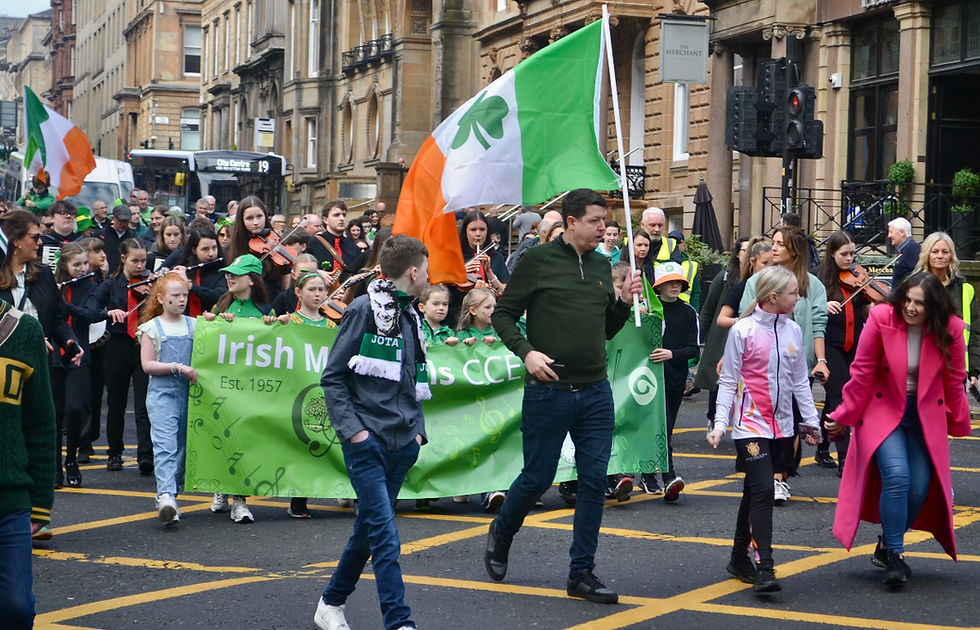Still marching to the same old, tired tune
- Dan McGinty
- Jul 8, 2024
- 3 min read
Updated: Oct 20, 2024

SCOTLAND was once again treated to the annual July parades, bringing with it a disruption to community life which once again disproportionally affected the Irish community in Scotland.
Scores of parades across Scotland culminated with the main Orange parade for 2024, which took place in Glasgow. The events raised numerous issues for the Irish community, particularly with regard to the statutory obligation to consider the human rights of those who will be impacted by the parades as well as those participating and—in a disappointing step backwards following progress in recent years—reports which have reached us of Orange marches pointedly being started from the environs of Catholic churches.
One example took place in Coatbridge, where the muster point for a march was chosen as the shadow of St Augustine’s, not merely a Catholic church but one which is noted for its high concentration of Irish parishioners, in a district which for more than a hundred years has been home to a large Irish community.
In an otherwise nondescript street, there can be few other reasons for its choice as the start of an Orange parade than the Catholic church and neighbouring Catholic primary school which dominate the area.
Restrictions also demand that when passing a place of worship, music not be played for 100m before and after the site, but the information received from witnesses at St Augustine’s suggests that no such accommodation was made by the band. On previous occasions in recent years, when silent protests by Call It Out were organised and publicised, the obvious presence of observers marking this distance had led to regulations being observed. However, with no obvious scrutiny in place, not even the police officers in attendance seemed to be enough to ensure this requirement was met.
Community concern
This incident was just one example of the concerns which are being raised by communities across Scotland, with Call it Out also outlining their efforts to collate such examples and bring them to the attention of authorities in the hope that more scrutiny will be applied in the future planning of marches.
“We are currently collating information from the various communities impacted by this wholesale monopolisation of Glasgow and elsewhere by anti-Catholic bigots,” a Call It Out spokesperson told The Irish Voice. “We will share this with the Divisional Commander of Greater Glasgow, Chief Superintendent Lynn Ratcliff and her
colleagues in other divisions in due course.
“We expect that to be used to feedback to local authorities on the next occasion any of these organisation submit notification of a procession. The kind of thing we are talking about is bands deliberately assembling outside churches and failing to abide by the Code of Conduct to cease playing music 100 metres either side of a place of worship. This is routinely breached but never referred to again by the Police Service of Scotland. That has to stop.”
Disprution and frustration
Thousands gathered in Glasgow, both to participate in and watch the largest Orange march, and aside from Irish community objections and concerns raised by Catholic parishioners of Glasgow, the wider community was also left questioning the wisdom of giving over the city centre to such an event.
Disruption to road users following an unexpected detour by one march led to confusion and delays around Bath Street and West Campbell Street, which also caused frustration. Though 28 roads were already planned to be shut to facilitate the Orange Order, this impromptu diversion only increased the imposition of marches on the life of the city and ensured that complaints extended far beyond those of the Irish community.
A total of eight arrests were made during the events of the day, with Police Scotland seemingly content that the arrestable offences were minor enough in nature—and the disruption experienced minimal enough—to declare their planning and police operations on the day to be a success.
“The offences were mainly for minor acts of disorder,” a police statement said. “A proportionate policing plan was in place and we worked with a range of partners to ensure public safety and minimise disruption to the wider community. I would like to thank the vast majority of the participants, and the wider community, who engaged positively and behaved responsibly throughout.”
That wider community, of course, included many people who stayed away from their own city centre in order to avoid the disruption and any anti-Catholic or anti-Irish behaviour—which there is long-established track record of during such events. The frustrations from this event—and particularly from the information which has been revealed about its planning—have led to a commitment from many quarters of the Irish community to offer their support to Call It Out as they redouble their previously successful efforts to ensure the rights of all those affected by such events are considered both by police and local councils.
PIC: M HANSELMANN







Comments